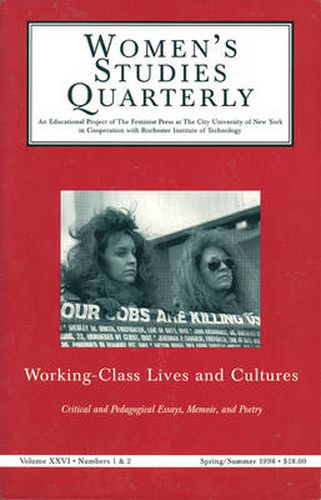Readings Newsletter
Become a Readings Member to make your shopping experience even easier.
Sign in or sign up for free!
You’re not far away from qualifying for FREE standard shipping within Australia
You’ve qualified for FREE standard shipping within Australia
The cart is loading…






This vital and engaging collection expands and builds upone Women’s Studies Quarterly’s groundbreaking 1995 volume, honored with an award from the Council of Editor’s of Learned Journals. The poetry, testimony, analysis, history, and theory collected here, which includes works by Patti See and Janet Zandy, not only suggests connective threads for understanding working-class experiences and literatures but also explores intersections of race, ethnicity, gender, sexual orientation, and class. Such explorations are arranged around the issue’s four themes: family, education, the workplace, and identity. From South African sexual relationships, to teaching Medieval studies to working-class students, to the politics of a deaf workers’ publication, to poems written in prison, this issue testifies to the growing depth and scope of working-class studies. Essential reading for all interested in the field, this issue offers an anvaluable framework for discussing working-class literature, culture, and artistic production, while also attending to the material conditions of working class peoples’ lives.
$9.00 standard shipping within Australia
FREE standard shipping within Australia for orders over $100.00
Express & International shipping calculated at checkout
This vital and engaging collection expands and builds upone Women’s Studies Quarterly’s groundbreaking 1995 volume, honored with an award from the Council of Editor’s of Learned Journals. The poetry, testimony, analysis, history, and theory collected here, which includes works by Patti See and Janet Zandy, not only suggests connective threads for understanding working-class experiences and literatures but also explores intersections of race, ethnicity, gender, sexual orientation, and class. Such explorations are arranged around the issue’s four themes: family, education, the workplace, and identity. From South African sexual relationships, to teaching Medieval studies to working-class students, to the politics of a deaf workers’ publication, to poems written in prison, this issue testifies to the growing depth and scope of working-class studies. Essential reading for all interested in the field, this issue offers an anvaluable framework for discussing working-class literature, culture, and artistic production, while also attending to the material conditions of working class peoples’ lives.